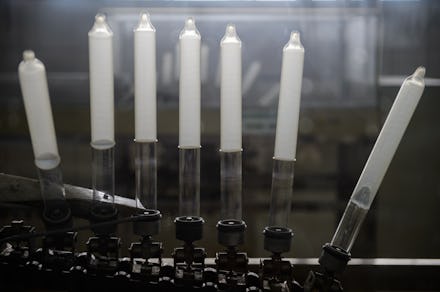Ever Wonder How Condoms Are Made? These Machines Are F*cking Amazing

Next time you intimately roll a rubber up your junk, thank the machines that worked tirelessly to make that moment happen.
A condom factory can produce 5 million love gloves a day, according to Wired — and you have to see these prophylactic-making contraptions in action. They dip, rotate, apply voltage to and vulcanize the latex that eventually ends up between your legs.
Billy Boy Condoms posted a video in 2011 spotlighting how its rubbers are manufactured.
Once Billy Boy acquires its latex — which gets harvested from rubber trees and then tested for quality — the first notch on the automated workforce belt is the dipping process.
Here, rotating glass phalli are fastened to a computer-monitored chain. They are slowly immersed into a vat of latex and then churned out of the dipping tank.
The latex film goes into drying and curing ovens. The immersion and drying processes happen twice to ensure adequate thickness.
Next, we have the rim job. The creation of the rolling rim is followed by a final drying process and vulcanization to achieve elasticity.
Dried condoms are removed from the glass phalli to be washed and dried.
Now, these precious contraceptives are run through an electronic test to make sure they aren't faulty. A high voltage is passed between the metal forms and rotating carbon fibers; if the voltage passes through an insulated condom, that condom will be rejected.
An automated assembly line then seals the rubbers into their airtight foil wrappers. This is also when they receive their lubricated coating and aromatic flavors.
"These sealed condom batches are now subjected to a whole series of elaborate inspections and tests," the Billy Boy video narrator states.
Test 1: Can it house 18 liters before bursting? Check.
Test 2: Can it stretch to 700% or more of the original coefficient? Check.
Test 3: Is it free of microholes? Check.
Test 4: Is it sterile? Check.
Next, the condoms are packaged using "state of the art technology" — and actual humans! — and automatically fitted with an instruction manual, lot number and expiration date.
Then humans (whose jobs could probably be replaced by robots, if Liam or Atlas are looking for a job) load the boxes onto a truck and off the rubbers go, ready for their next wild adventure.